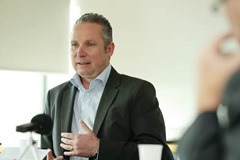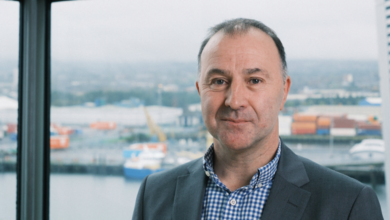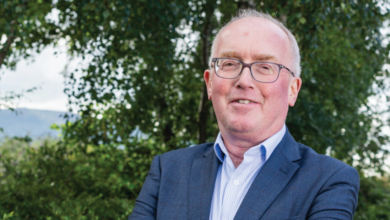IBM round table: capturing the value of big data
 IBM hosted a round table discussion on the way forward for big data with a group of senior managers across businesses and the public sector in Northern Ireland.
IBM hosted a round table discussion on the way forward for big data with a group of senior managers across businesses and the public sector in Northern Ireland.
How important is big data in your sector?
Brian McKeown
Until recently, it hasn’t been hugely important but its importance is growing. The HSC has an enormous amount of legacy data going back years on things e.g. the many millions of prescriptions that have been issued, but here are concerns around privacy and data protection issues. We also have data on the type of care people are getting in hospitals. We have more data than we know what to do with at the moment. Data are currently being used for performance management and syndromic surveillance where data from systems are analysed on an ongoing basis for disease trends. Data are also used for flu monitoring looks for early signs of flu epidemics.
Doctors in some of our hospitals are using data to triage people to determine if they should be admitted straight into hospital rather than go through the normal admissions process. There are a lot of data out there and there is a growing interest in how we can use those valuable data sets to change how care is planned and delivered, but it is still in its infancy.
Niall O’Donohoe
Along with cloud and smarter planet, big data is the key growth initiative for IBM. We have been buying companies over the past 10 years to bring solutions to harnessing that data Brian was talking about.
From IBM’s perspective going forward, data are the basis for competitive advantage. The successful enterprise of the future will use data as the basis for every decision within the organisation. Secondly, mining that data will be the basis for developing new products and services. Thirdly, the successful enterprise will use data to nurture and personalise individual relationships, one-on-one, with their client set.
For example, an insurance company needs to know me as an individual and to know my personal preferences and what my biases are. Successful companies in that sector will need to harness data to know me as an individual.
Data are really going to be the building block for successful organisations going forward.
In local government and particularly in managing a city, big data is growing in importance. There are two aspects to this: how we collect and analyse our own data; and how we use external data sources that will help us manage the city.
At the minute, it is being driven by our political leaders and chief officers. There is an insatiable demand for local area-based information. They constantly want to know what the council’s money is being spent on and where it is being spent. That then influences the decision-making for delivering our services.
Our access to external data sources, particularly from central government, is growing in importance. This is epitomised by the Smart Cities challenge we have just completed with IBM. The information for this came from hundreds of data sources. The important thing that came out of this was the agreement to implement a city-wide metric to measure all of the programmes that are linked to tackling poverty and unemployment to achieve co-ordinated outcomes.
Fustina Donaghy
Within the insurance industry, it is important to get into big data and analytics to provide better, more targeted insurance products for our customers and to gain competitive advantage. We have been collecting business data for years from existing systems but it is now about branching out into external data sources such as telematics information – really any source of information we can use to enhance our insurance products.
Paul Jeynes
At Citi, we deal with massive amounts of data on a daily basis and that supports our business. For example, we pull in huge amounts of market and pricing data and that drives the investment bank business and the order and executions that we do. Before leaving the office, I did a quick check on the amount of data that is dealt with in the data warehouse that I look after and it is something like 250 million messages a day.
So that is a huge amount of data and we are only really starting to delve into that data and look at what it tells us and what we can do with it. The main importance for us is making sure we meet regulatory requirements in various jurisdictions around the world. It is extremely important that we meet those requirements, whether in the US or Asia.
We are only starting to look how we can push analytics out of that data. We are looking at threads of information – from order to order to order – and we are trying to spot trends that will give us an advantage over our competitors because there is a squeeze on the amount of money we make out of each order. It is like a technology arms race and we are after any advantage we can get out of our data. We are scratching the surface as regards the analytical value we can get out of the data.
Trevor Steenson
The creation of these huge amounts of data and the requirement to make sense of the data are having a big impact on the geographic information sector. There is increasing recognition – even at a United Nations level with the initiative on Global Geospatial Information Management – that big data will drive the demand for geospatial information as people look to the location attributes within the data to help identify patterns. Within the geospatial sector, it is about developing geospatial information to ensure that it can support big data.
Within Northern Ireland, it is not just the mapping data created by Land and Property Services that will support analysis of big data but also the spatial data created right across the public and private sectors.
Before we start drilling down into the issues around big data, what is the definition of big data?
Niall O’Donohoe
The most useful definition I have seen is, in a word, insight. It gives you insight and that can be known or unknown insight. You have got to be prepared that you are going to get insight into something you do not know about. There are going to be trends and directions that you are unaware of and they will inform your thinking going forward.
Obviously, it is about analysing your data on as wide a spectrum as possible and not just within your organisation but within your ecosystem – your supplier, customers and the marketplace.
Paul Jeynes
The term big data has become a bit loaded. It has got a bit of history and a bit of hype about it. Whenever I hear the term, I am slightly concerned that it is a term that people don’t really understand what it really means. They think of a number of buzz words or products but really what does it means underneath it all?
To me, it means processing huge volumes of information as fast as possible to gain competitive advantage, whether using the latest version of an open-source product or something IBM produce. The implementation is not as important as what you get out of the end.
Big data is about volume but also about the variety of data, both internal and external, that can be combined using the latest technologies. This external data could be structured or unstructured data coming from sensors or social media for example. By applying more data analytics to this data, businesses can achieve greater value.
Niall O’Donohoe
With the cost of transistors and sensors, it means you can now digitise almost anything and get data from it. A good example I have come cross was the digitisation of hundreds of kilometres of train tracks which enabled the prediction of when the tracks were going to fail.
Trevor Steenson
I would add another ‘v’ – velocity – to the volume and variety described by Paul and Fustina. The speed at which we are now collecting data means we need to process the data as they come in and rapidly make informed decisions.
Brian McKeown
There has been an exponential growth in data but just having lots of data doesn’t really change anything. The key to effectively using the data are analytics and what organisations can do with the data. It is about doing, and planning, business in a different way than we have up until now. That is a huge challenge – and needs a complete change of mind-set.
Paul Jeynes
One area of big data that makes me wary is that it is seen as an initiative that has been taken over by technology and pushed onto the business. It is a lot like: “We have this solution, can you use it in the business?”
Niall O’Donohoe
Well, who in the organisation should own big data?
Paul Gribben
I think we all agree that it should be owned by the business. You need to take a step back and look at the problem you are trying to solve first and then apply the technology.
Although it is often the case that the insight is from an unknown in the data.
Trevor Steenson
It is very similar to what we faced with geographic information, which was a solution looking for a problem. Now 20 years later, it is recognised as being a part of other information systems and not a stand-alone technology.
Have you any good examples where big data has been used effectively?
Paul Gribben
A number of years ago, we bought a data analysis tool and pointed it at our finance information and linked it to our HR, payroll and time and attendance information and where our assets are. You are talking millions of rows of data and it is very useful for analysing simple things like absence and agency costs. It is also useful in gathering information across the whole organisation – we come into contact with anti-social behaviour across the organisation. We can now gather information on anti-social behaviour across all of our systems and very quickly analyse this to help us to make better decisions.
Fustina Donaghy
An example of big data working is the collection and analysis of telematics data in cars. Insurance organisations can use these sensors to collect geospatial data and detailed data on a person’s driving behaviour. This can be used to determine if a person is driving and decrease or increase their premiums appropriately. It can also be used to determine driving activity prior to and during an accident to aid the fast resolution of claims, making customers happier.
Niall O’Donohoe
We are working with an internet-based organisation in Dublin who do web hostel booking. They are a fast growing business with 100 people. Over a six-week period we monitored all social media and internet references to their company name. We came back to them and asked them: “After English what is the most commonly used language that is used to reference your name?” They said: “French? Spanish? German?” The answer was Indonesian! That will now determine where they point their marketing spend. They didn’t know that and didn’t go looking for that.
In health, there is work around syndromic surveillance, with daily feeds from hospital departments looking at what people are presenting with. We are looking for spikes or strange things happening in order to intervene at the right time. It is similar to flu monitoring with data from GP practices.
Another example where big data is beginning to be used is in the area of risk stratification. This is being able to predict that without intervention a patient will become ill and end up in hospital using expensive resources. Data are collected from GP and hospital systems to look for signs that if a patient does not have a particular treatment then they may have a heart attack in a few years or may will develop COPD. It is about being predictive and pro-active with interventions – this is a growing area in healthcare.
Niall O’Donohoe
A good example is the work IBM is doing with one of the leading cancer experts in the US. He has been diagnosing and treating patients for 30 years and he says he is overwhelmed by the amount of data he has to analyse in order to figure out which drugs to give to his patients.
At the moment, he has a standard guideline as to what drugs to give his patients. He has to decide what to give his patients from an array of hundreds of drugs and he has to process all the patient’s historical medical data – all in a short period of time. He is piloting a new technology with IBM called Watson. This is a computer-based system that analyses all this data in real time.
Interestingly, it will not provide one correct answer but will offer a number of possibilities, ranked by probability and it gives evidence for each result. For example, it will give a 95 per cent confidence result backed up by references from journals and clinical trials. It is moving computer systems to more and more thinking in the way that humans think.
What challenges need to be overcome to get the benefits from big data?
Paul Gribben
Collaboration is a big challenge for us. As a council, we need information from many different sources in order to have an impact on city planning. With the reform of local government and the introduction of community planning, there is going to be a requirement for much more collaboration.
Challenges for us include cross-border legislation and data privacy. Also, how do we pay for big data? How do we make the business case for it? There are also not that many people yet who are data scientists.
Trevor Steenson
Capability within the spatial information industry is growing as suppliers recognise the link between big data and spatial information. Although there are a lot of job vacancies in the big data sector, the universities will quickly pick up on that.
Fustina Donaghy
One of the big challenges is the visualisation side of big data. From the technology point of view, there has been a lot of advances around the collection and storage of big data and around retrieval but the visualisation and business intelligence side of it is still very traditional and bringing that into line is a big challenge.
Brian McKeown
The big challenges in the health sector are around sharing data and establishing clinical analytics as a specialty. There are many professional and ethical concerns around sharing health data, even if they are made anonymous. There is a move towards setting up an ‘honest broker’ to give suitable access to health. It is a very guarded approach but the prize in utilising these data are huge.
Niall O’Donohoe
Organisations need to see data and information as a valuable resource and put resources around that. As regards a starting point, pilots are useful. We recently said to an agri-food company, give us some of your data and let us play with it. We went back and told them that you are making milk when you should be making cheese – when the demand is at its highest. Again, it was an insight they didn’t go looking for as things were going well for them.
What levels of capability exist within your industry for leveraging big data?
Trevor Steenson
It is growing. There is great interest in this area and people see the opportunities.
Paul Gribben
There is a skills gap in our organisation. There are lots of data but we are not extracting as much insight from it as we potentially could. We have a clear skills gap.
Brian McKeown
It is the same in health. We have lots of data but not the skills to leverage them. We need to see a mind-set shift to change that.
There is also political interest in it. Our Minister, Edwin Poots, is very keen and is in the process of setting up an honest broker who will take data from parts of the Health Service, join them up and make them anonymous. We are currently discussing how it should be released to the business and research sectors.
Is there one area managers or policy-makers should focus on in order to make big data happen?
Brian McKeown
I don’t think there is one single issue that you can focus on to make it happen. From my perspective, the starting point has to be to get senior management to appreciate the potential of big data and to understand the benefits it can really bring. That is about evidence and seeing and believing that evidence.
In order to use big data in the Health Service, it requires a whole change in the way of thinking. It really is a new discipline and it is about getting senior people to believe it is worth investing in, and that is not just money and technology but people’s time.
Niall O’Donohoe
I agree with Brian. It is the willingness from senior management to see that data are now what will set successful organisations apart going into the future. Will the organisation have a chief information officer?
Paul Gribben
Big data is inevitable and it’s happening anyway. We possess loads of data but we also have to exercise judgment with it because we work in a political organisation and I don’t think that is any different from other organisations. There is an onus on us to present information in a neutral way so that decisions can be made fairly. That judgment piece really stands out for us.
Fustina Donaghy
The biggest challenge for managers is to find that nugget of information that will inspire the business to invest time and money into big data and the analytics that are critical to its success. Niall’s cheese example earlier would be an example of this.
Paul Jeynes
It is about defining a business-understandable case and that has to come from the business. It can’t be the tail wagging the dog.
Some of the biggest benefits of big data will come from combining an organisation’s own data with those from other organisations, possibly from other sectors.
The Participants
Fustina Donaghy
Fustina Donaghy is a Principal Database Designer for Liberty Information Technology. She is an experienced database specialist, instrumental in the design and development of high volume, mission critical systems. She has worked across both start-up and multinational organisations in industries including petroleum, property, VOIP and most recently the insurance industry.
Paul Gribben
Paul Gribben is Head of Digital Services in Belfast City Council and is responsible for the council’s ICT application portfolio and ICT infrastructure. Paul is currently working on the delivery of the £13.7 million Super-connected Belfast project which will provide Belfast with a world-class telecoms infrastructure. Paul joined the council’s ICT service 23 years ago and now heads up the delivery of digital services across the council.
Paul Jeynes
Paul Jeynes is Citi Global Equities’ data architect for a major middleware messaging solution in use within the bank. This solution moves a very high volume of messages onto a common bus for subscriber consumption using large scale appliance based warehousing solutions. He has worked in IT over 20 years across public and private sectors in both technical and management roles.
Brian McKeown
Brian McKeown is an Assistant Director in the Performance Management and Service Improvement Directorate in the Health and Social Care Board. His role encompasses ICT programme and project definition; ICT commissioning; stakeholder engagement and ICT capital programme management. Prior to joining the HSCB in May 2009, Brian was Acting Director of Information Systems in the Department of Health, Social Service and Public Safety.
Niall O’Donohoe
Niall O’Donohoe is Director, Sales and Distribution, at IBM Ireland. Niall has held a variety of positions across sales and marketing in both the Irish and international markets. Previous roles included Territory Sales Manager at the company and Storage Sales Leader in Europe with responsibility for IBM sales into SME businesses in the UK, the Nordics, Germany, Austria and Switzerland. Niall holds a bachelor of business studies degree from the Institute of Technology, Sligo.
Trevor Steenson
Trevor Steenson is Chief Survey Officer for Northern Ireland, working for Land and Property Services. Trevor has been closely involved in the Geographic information (GI) strategy for Northern Ireland since the mid-1990s, and chairs the strategy’s delivery board and the Northern Ireland INSPIRE Technical Sub-Group. He is particularly interested in the use of GI to effectively visualise big data. Trevor is also a member of the UK Location Council and is head of the GI profession for the Northern Ireland Civil Service.











